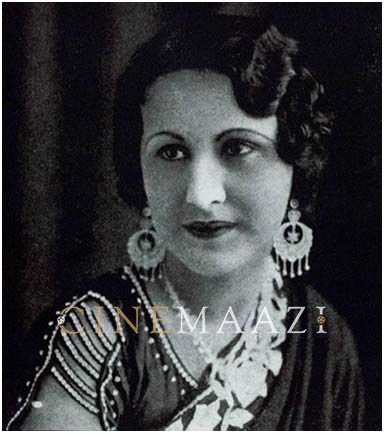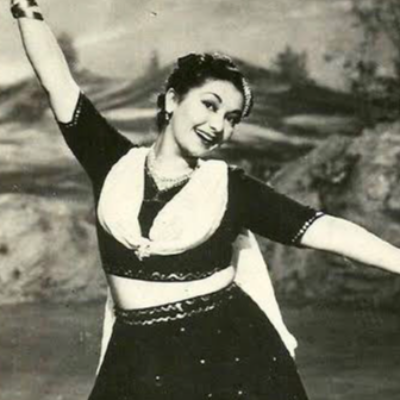Patience Cooper

Subscribe to read full article
This section is for paid subscribers only. Our subscription is only $37/- for one full year.
You get unlimited access to all paid section and features on the website with this subscription.
Not ready for a full subscription?
You can access this article for $2 , and have it saved to your account for one year.
- Born: 1905 (Calcutta, Bengal Presidency, British India)
- Died: 5 April, 1993 (Karachi, Pakistan)
- Primary Cinema: Hindi
- Spouse: MAH Isphahani (divorced), Gul Hamid Khan
Patience Cooper is considered by many to be the first Indian film star, appearing in a string of successful films. An Anglo-Indian from Calcutta born around 1905, she started off as a dancer in a Eurasian troupe called Bandmann’s Musical Comedy, before she was signed up by Madan’s Corinthian Stage Company. Strikingly beautiful, she went on to play the lead in several Madan Theatres pictures such as Nala Damayanti (1920), Dhruva Charitra (1921), Pati Bhakti (1922), Ratnavali (1922) and Noorjehan (1923). Established in silent films she also successfully made the transition to talkies. She was often cast as the woman at the centre of troubling moral quandaries, a type of role that was later often essayed by Nargis. With Cooper’s sharp eyes and skin tone, technicians were able to achieve the ‘Hollywood look’, experimenting with eye-level lighting. Possibly playing the first ever double roles in Hindi films in Patni Pratap (1923), as well as Kashmiri Sundari (1925), Patience starred as leading lady through the 30s. Featuring in Iraada (1944) and Khan Saheb (1946), which were among her last films, she migrated to Pakistan in 1947. Changing her name to Sabra Begum, she adopted and cared for several children.
Born in 1905 in Calcutta, Patience Cooper started off her career as a dancer before joining Jamshedji Framji Madan's Corinithian Stage Company as an actress. She first made an impact playing Damayanti in Nala Damayanti (1920) opposite Keki Adajania who essayed the role of Nala. The film, a big budget Madan Theatre production, was directed by Italian Eugenio De Liguoro, who known in Italy for his Orientalist spectacles like Fascino d'Oro (1919). The film made waves for its special effects incorporated in the scenes such as Narada's ascent of Mount Meru to heaven, the transformations of four gods into impersonations of Nala, and the transformation of Kali into a serpent.
There was no looking back for Cooper, who went on to act in Vishnu Avtar (1921), featuring in over 40 films until her retirement with Iraada (1944). She was the lead in two of Sisir Bhaduri’s films – Mohini (1921) and Kamale Kamini (1922). Among her significant releases was the De Liguoro- directed mythological Dhruva Chartitra (1921), which was Madan Theatres’ bid for an international break. Patience played the female lead Suniti amidst a cast that included many Europeans. Pati Bhakti (1922) was one of her biggest hits, directed by J J Madan himself. The film, advocating women’s devotion to their husbands, was even ordered by the Censors to edit out a dance number which was deemed obscene. She also collaborated prominently with Jyotish Bannerjee and Priyanath Ganguly. Another typical Cooper-starrer was Zehari Saap(1933), about a medieval chieftain's revolt against the good Nawab Bakar Malik. Appearing in a string of successful films, she is acknowledged as the first ever female Indian film star. Among her many releases are Sati (1922), Laila Majnu (1922), Noorjehan (1923), Patni Pratap (1924), Turki Hoor (1924), Sati Lakshmi (1925), Dharmapatni (1926), Durgesh Nandini (1927), Aankh Ka Nasha (1928), Giribala (1929), Chatra Bakavali (1932), Zehari Saap (1933), Kismet Ka Shikar (1934), Baghi Sipahi (1936), Fakhr-E-Islam (1937), Rani (1943), and Khan Saheb (1946).
The conservative attitudes of the times which led to a low percentage of Hindu women in the film industry was seen to be one of the reasons behind the demand for Anglo-Indian actresses like Cooper. Her facial features, dark eyes and hair combined with light skin tone also allowed technicians to experiment with eye-level lighting in use in the west, to successfully achieve the 'Hollywood look' for Cooper, which was essentially an appearance similar to Hollywood stars of the silent era. To her also goes credit for playing one of the earliest ever double roles in Hindi films - Patni Pratap (1923) in which she played two sisters, and Kashmiri Sundari (1924) which saw her play mother and daughter. It will be recalled that Anna Salunkhe had played the first double role in Indian film, playing both Ram and Seeta in Lanka Dahan (1917).
On the personal front, Cooper married M A H Isphahani, a tea-estate owner. In 1947, they migrated to Pakistan. She had been earlier married to Isphahani at the age of 21 but divorced soon after. She went on to marry Gul Hamid Khan, an early silent movie actor. He died six years later due to a throat ailment. She remained friends with Isphahani till the end of her life. Cooper went on to adopt the name Sabra Begum and is said to have fostered and/ or adopted 17 children during her lifetime.
Patience Cooper passed away on 5 April, 1993 in Karachi, Pakistan.
-
Filmography (44)
SortRole
-
Irada 1944
-

Ranee 1943
-
Khyber Pass 1936
-
Baghi Sipahi 1936
-
Murderer 1935
-
Rajsinha 1930
-
Ganesh Janma 1930
-
Vaman Avtaar 1930
-








.jpg)



